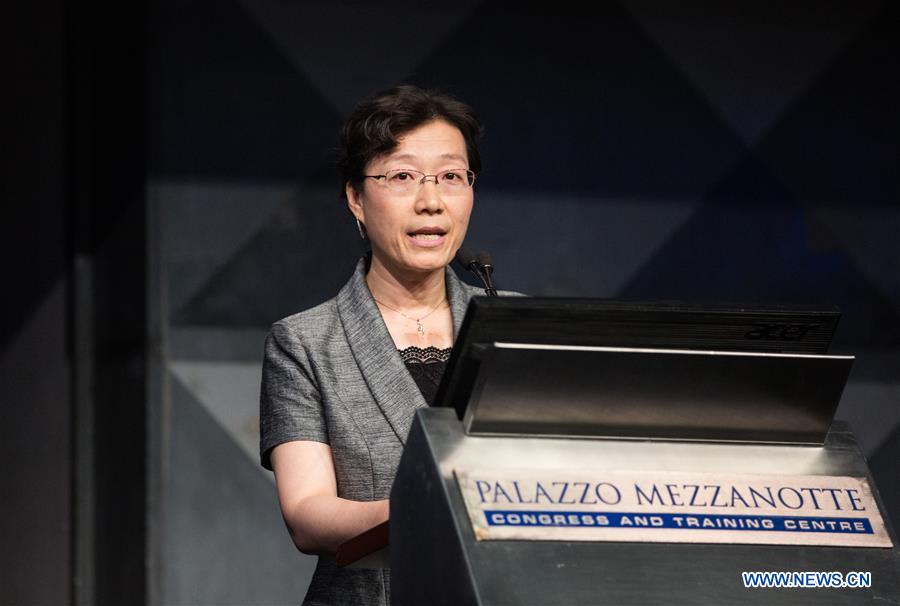Italian business community eyes opportunity in Belt & Road cooperation

Charge d'Affaires at the Chinese Embassy in Italy Zheng Xuan speaks at a conference in Milan, Italy, June 28, 2018. (Xinhua/Jin Yu)
Italian and Chinese entrepreneurs, experts and officials Thursday gathered at the Milan stock exchange for a conference to discuss ways to seize opportunities from the China-proposed Belt and Road Initiative (BRI).
Present at the conference was China National Tire & Rubber CEO Filippo Maria Grasso, who told a success story about historic Italian tire maker Pirelli and its partnership with property developer Chinachem.
"I believe the Silk Road (Belt and Road) can be defined as a relationship model -- infrastructural, technical, cultural, technological -- but most of all it is a great system of meetings: it will bring not only goods but also ideas," Grasso said.
Grasso highlighted China's vision of a win-win model. "China does not recognize the kind of suffocating primacy where you have a big winner and a big loser, because it is a system that can't last...," he said.
Launched in 2013, the BRI refers to the Silk Road Economic Belt and the 21st Century Maritime Silk Road, which seek to serve as a platform for international cooperation, and create new drivers for shared development to benefit more countries and peoples globally.
China's trade with countries along the Belt and Road has exceeded 4 trillion U.S. dollars and stock investment is over 60 billion dollars, according to official Chinese statistics.
Italian Ambassador to China Ettore Sequi told attendants in a video call from Beijing that the BRI has grown to include a variety of projects.
In the first three years of BRI, the majority of the projects were infrastructural. Today that percentage has significantly dropped, with the remaining BRI investments pouring into manufacturing, services and advanced technologies, the ambassador said.
More than 80 countries and international organizations have signed over 100 cooperation documents with China and a large number of cooperation projects have been implemented under the BRI framework.
"Italy has all the tools it needs to play a leading role -- the companies, the logistics, the trading capabilities, the quality products," he said. "We must be swift in seizing these opportunities -- we have extraordinary potential."
The ambassador was echoed by Spea Engineering President Paolo Costa, an advisor for the Organization for Economic Cooperation and Development.
"Objectively speaking, we (Italy) are the ideal access (for the BRI into Europe) -- the one that would achieve the lowest costs for everyone involved," Costa said.
This "means not so much building things, but building an overall capacity to exploit the entire logistical chain, from departure to arrival," he said.
Italian Infrastructure and Transport Minister Danilo Toninelli, whose populist Five Star Movement has long opposed large-scale public constructions, surprised the conference by calling the BRI "a challenge on the planetary level -- a frontier in which Italy can and must play a leading, frontline role in many opportunities to come."
"We must be ready, and the only way to do this is to take actions to overcome our infrastructural and logistical shortcomings, beginning with our ports," he said.
Class Editori CEO Paolo Panerai, whose publishing company co-organized the conference, told Xinhua that while the Five Star Movement voter base opposes some infrastructural projects, there are competent officials in Italy's new government who understand the value of the BRI.
"In consideration of the 5 million Italians living in poverty, they understand that this is an extraordinary opportunity to promote the development of the economy in a way that will benefit (our people)," he said.
The charm of BRI certainly goes beyond Italy. Former center-left Prime Minister Romano Prodi, a leading economist who also served as president of the European Commission, called the BRI "a global proposal, whose underlying premise is a lasting bond (with the countries involved)."
The European Union (EU) as a whole must take charge of the process of preparing for the changes the BRI will bring about, Prodi said, citing the solar energy as an example.
"China is the world's biggest producer of solar panels," he said. "Imagine what an EU-China solar panel deal for Africa could be."

